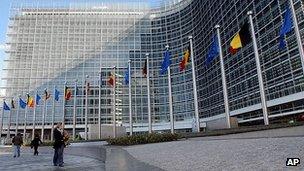EU plans for possible Greek exit from euro - official
- Published

The European Commission is keeping the Greek budget under tight supervision
The European Commission and European Central Bank are making contingency plans for a possible Greek exit from the euro, an EU commissioner says.
Trade Commissioner Karel De Gucht said such plans would minimise any "domino effect" from Greece.
He was speaking in an interview with Belgium's De Standaard newspaper.
But his views were challenged by EU Economic Affairs Commissioner Olli Rehn, who said: "We are not working on the scenario of a Greek exit.
"We are working on the basis of a scenario of Greece staying in. We do not comment on speculative issues," he said in a statement.
'Emergency scenarios'
A new opinion poll suggests Greek voters are turning back to parties which supported the recent bailout and the austerity measures it required.
Believed to be the first survey taken since the date of the new election - 17 June - was announced, the Marc poll for Greek TV channel Alpha indicates that the conservative New Democracy (ND) party has overtaken the far-left Syriza.
Fitch Ratings Agency has downgraded five Greek banks to CCC from B-minus.
It similarly lowered Greece's credit rating on Thursday, citing the heightened risk that the country might have to leave the eurozone.
During the eurozone crisis Brussels has insisted that it wants to keep Greece in the euro, while demanding that Athens fulfil pledges to cut spending.
"Today, whether within the European Central Bank or the European Commission, services are studying emergency scenarios where Greece cannot manage," Mr De Gucht told De Standaard.
He added that "a Greek exit does not mean the end of the euro, as some claim".
He did not give details of the plans being made in Brussels and Frankfurt - the headquarters of the Commission and ECB.
One ECB executive board member said the bank was strongly in favour of Greece remaining part of the eurozone.
"It is our strong preference that Greece remains in the euro," Jose Manuel Gonzalez-Paramo, who is due to leave the ECB at the end of May, told Reuters news agency.
Mr Rehn implied that Mr De Gucht had spoken out of turn.
"Karel De Gucht is responsible for trade. I am responsible for financial and economic affairs and relations with the ECB," Mr Rehn's statement said.
Voters 'scared'
Opinion polls just after the election on 6 May put Syriza, which had come second behind ND, in the lead.
According to the Marc poll, ND is back in front with 23.1% to 21% for Syriza, while the socialist Pasok, which also backed the bailout conditions, is put on 13.2%.
Speaking to Reuters, political analyst John Loulis commented: "It seems people vented their anger in the election and then they got scared.
"They disliked that there was no government and they got worried about a possible exit from the euro."
He added that voters were still "far from enthusiastic with New Democracy".
"The outcome of the elections will depend on who will make the fewest mistakes," he said.